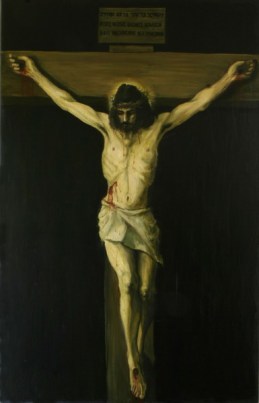Friday, October 16, 2009, 1:29 PM

Crucifixion (16th century)
This post addresses a Roman Catholic Church's magisterial document, the Catechism of the Catholic Church's teaching on the fourth article of the Apostles' Creed ("Jesus Christ suffered under Pontius Pilate, was crucified, died, and was buried"), and in particular the second clause ("was crucified, died").
The document is linked at the webpage titled Paragraph 2. Jesus Died Crucified, @ vatican.va.
Herebelow are my comments relative to the CCC paragraphs selected from that page.
[599] I would NEVER suggest that Jesus' violent death was the result of chance in an unfortunate coincidence of circumstances, in fact I do believe that his death is indeed part of the mystery of God's plan. BUT, as I refuse the dogma of the "trinity", whereby Jesus would have pre-existed, as a "divine person", his existence as divine-human person, I affirm (with the Gospels, BTW ...) that Jesus was NOT fully aware of the entirety of the Plan of YHWH God, the Father Almighty. What does this mean? Does it perhaps mean that God, the Father Almighty and Father of Jesus, presciently did what follows?
God, the
Father Almighty, who loves His Creation so much as to give it His
One-begotten Son, in the end is also the one who sent Him in this world
without any warning of danger, who literally gave Him the illusion of
the imminent foundation of God’s Kingdom, and of the possibility to
establish this Kingdom in a non traumatic way. --Miguel de Servet, Trinity and Incarnation: a solution
NO, it does NOT mean this: this would NOT be an Euangelion ("good news"), BUT a cacangelium ("bad news" - of course in a sense totally different, nay opposed to the one in which Martin Luther used the expression cacangelium to refer to the Sermon on the Mount)
Jesus knew that he was the Son of God and that he had been appointed by YHWH God, the Father Almighty, to be His chosen one, His Anointed King, the one who woud affirm God's Kingdom on earth.
BUT, in a world tainted by sin (in the Judea of Jesus' time, epitomized, in the Gospels, by the betrayal of his chosen friend and Apostle Judas Iscariot, by the lies of the High Priest Joseph Caiaphas, by the pretence of justice and true violence of the Roman Prefect Pontius Pilate), Jesus came armed ONLY with Truth and Love: it was inevitable (NOT necessary) that he would succumb to these forces of darkeness and die on the Cross.
[600] NO, it is not true that "To God, all moments of time are present in their immediacy". The CCC interprets Acts 4:27-28; Ps 2:1-2 in a deterministic way, which is incompatible with real freedom with which God endows every human being. Besides, the CCC grossly confuses God's decrees with His "permissive will".
[601] Once again ...
“The Passion and Death of Jesus was NOT "necessary" BUT inevitable”
... even the Magisterium of the Catholic Church is evidently incapable of making this essential distinction. :(Jesus' full awareness of the inevitability of the Cross only came with/immediately after Peter's Confession at Caesarea Philippi (see Matthew 16:13-28)]
[606] Once again ...
“The Passion and Death of Jesus was NOT "necessary" BUT inevitable”
Once again, Jesus' full awareness of the inevitability of the Cross only came with/immediately after Peter's Confession at Caesarea Philippi (see Matthew 16:13-28)As for the CCC's quotation from Jn 10:17-18, I believe that it entails an (implicit) wrong interpretation.
The CCC (to be fair, along with most interpreters) seems to take it for granted, in spite of the absolute predominance of NT passages from which it is clear that Jesus "was risen" by God, NOT "rose by his own power", that John 10:18 has enough conclusive weight to tilt the balance in favour of "rose by his own power".
For a very different interpretation (AFAIAC, the only acceptable one) I recommend the reading of this (IMO excellent) essay: Did Jesus Christ raise himself from the dead? by Ivan Maddox
[607] In the first two verses quoted in the CCC, John 12:27 and John 18:11, I see absolutely nothing different and nothing more than what we read in the Synoptics (Matthew 26:39; Mark 14:36; Luke 22:41-42 and Matthew 26:52-54, respectively). They all express NOT "prescience" of the Will of the Father, BUT gradual acceptance of the inevitability of what the obedience to the Father's Will entails.
As for the CCC's pithy quotation from John 19:28 (“I thirst”), in its full context (The Death of Jesus, John 19:28-30), it expresses the awareness that, with his death, the Will of the Father has been fully satisfied, because nothing can be done by Jesus beyond that, other than "committing his spirit in God's hands" (Luke 23:46; Ps 31:5)
[608] I have no objections to make to what the CCC says, only, again, a remark: the words with which Jesus expresses his intervened full awareness of the inevitability of the Cross, incompletely cited by the CCC (“For even the Son of Man came not to be served but to serve, and to give his life as a ransom for many.” - Mark 10:45), come after Peter's Confession of the Messiahship of Jesus at Cæsarea Philippi (Mark 8:27-30).
[622-623] I have no objection to make to the summary of the CCC [619-623], and in particular to 622 and 623. Just, once again, in the way of conclusive comment I confirm:
“The Passion and Death of Jesus was NOT "necessary" BUT inevitable”

No comments:
Post a Comment